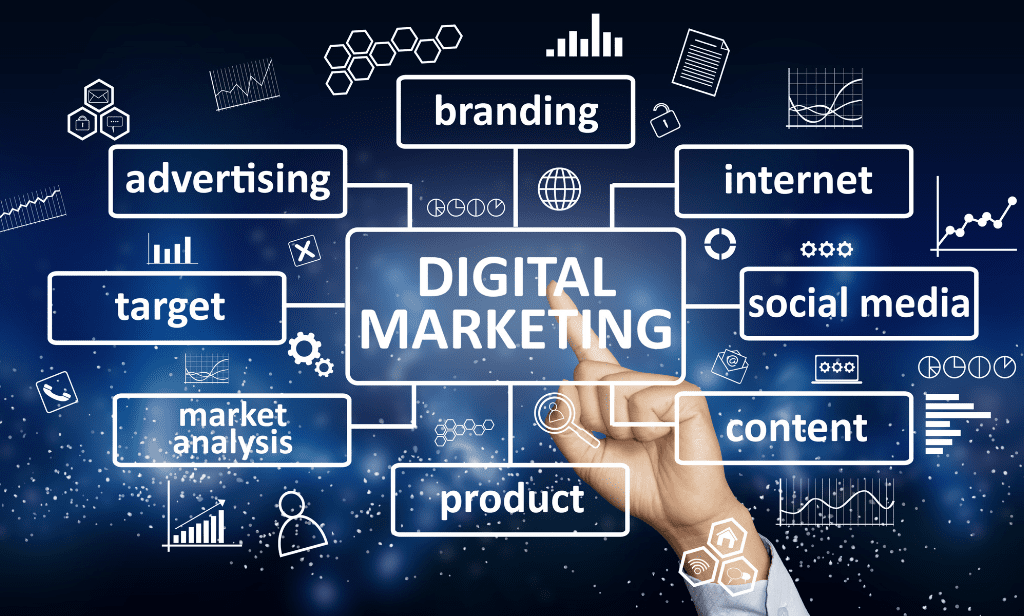Crucial Tools and Methods for Digital Marketing Lockhart Success
Crucial Tools and Methods for Digital Marketing Lockhart Success
Blog Article
Transform Your Business With Data-Driven Digital Advertising
In today's quickly evolving industry, leveraging data-driven digital advertising has become crucial for businesses intending to improve their competitive edge. By employing analytics to get insights into consumer behavior, companies can tailor their marketing methods for maximum effect.
Recognizing Data-Driven Advertising And Marketing
Data-driven marketing is increasingly recognized as an important strategy for organizations intending to improve their advertising performance. This method depends on the methodical collection, analysis, and utilization of information to notify marketing methods and decisions. By leveraging different information resources, including client demographics, actions patterns, and market patterns, services can develop targeted projects that resonate with certain audiences.
At its core, data-driven marketing includes incorporating analytics right into the advertising procedure. This enables real-time understandings into project efficiency, allowing marketers to make enlightened modifications and optimize their methods. By understanding customer preferences and involvement levels, organizations can craft individualized messaging that is more most likely to convert potential clients right into dedicated customers.
Additionally, data-driven marketing cultivates a society of responsibility within organizations. Online marketers can track their roi (ROI) and examine the performance of various networks, such as social media sites, email, and online search engine. This analytical strategy not only enhances decision-making yet also encourages constant renovation in advertising and marketing techniques as organizations fine-tune their strategies based upon empirical evidence. As organizations embrace data-driven advertising, they position themselves to react efficiently to altering market dynamics and consumer assumptions.
Advantages of Information Analytics

One of the main advantages is the capacity for tailored advertising and marketing. Information analytics enables services to sector their target market properly, customizing messages and provides that reverberate with details groups. This degree of customization not only enhances engagement rates however also cultivates brand name commitment.
In addition, information analytics promotes real-time decision-making. Online marketers can monitor project efficiency continuously, readjusting tactics based on prompt responses and results. This dexterity results in maximized resource allocation and improved return on financial investment.
In addition, anticipating analytics empowers companies to anticipate future patterns and consumer requirements, allowing for aggressive methods instead of responsive measures. This insight can be a significant competitive benefit in today's dynamic market landscape.
Key Tools and Technologies

One of the essential technologies is Customer Partnership Management (CRM) software program, which permits businesses to manage client interactions and assess data throughout the client lifecycle. Furthermore, advertising and marketing automation systems enhance repeated jobs, facilitating tailored communication and lead nurturing.

Data visualization devices, such as Tableau and Google Data Studio, assistance professionals translate complicated data collections, providing insights in a conveniently digestible layout. In addition, analytics platforms like Google Analytics supply important metrics on internet site traffic and user behavior, allowing marketers to optimize their strategies.
Social network analytics tools, such as Hootsuite and Sprout Social, offer understandings into audience involvement and web content efficiency across different platforms. Last but not least, A/B screening tools, like Optimizely, allow marketing experts to trying out various methods, making sure that data-driven choices are continuously refined. By leveraging these technologies, companies can foster a data-centric society, leading to much more effective digital marketing projects.
Carrying Out Effective Approaches
To efficiently apply effective approaches in digital useful content marketing, companies should first straighten their purposes with workable understandings originated from data analytics. This positioning makes it possible for companies to tailor their advertising and marketing efforts, guaranteeing they resonate with target market. By leveraging data from different channels, such as social media, email marketing, and web site analytics, business can recognize trends, choices, and habits that educate their approach.
Next, it is critical to prioritize client division. By categorizing their target market based on demographics, rate of interests, and acquiring actions, organizations can produce tailored advertising and marketing projects that drive engagement and conversion. Automation tools can facilitate this process, enabling marketing professionals to deliver timely, appropriate material to certain sections.
Furthermore, embracing an agile advertising and marketing technique can improve responsiveness to market changes and client feedback. Frequently examining project efficiency and making data-driven changes can enhance results and resource allocation.
Last but not least, cultivating a culture of cooperation in between advertising, sales, and data analytics groups is crucial. This multidisciplinary approach guarantees that understandings are properly shared and incorporated into broader business approaches, ultimately driving sustained growth in an affordable landscape.
Determining Success and ROI
How can companies efficiently determine success and roi (ROI) in digital advertising and marketing? The answer lies in developing clear purposes and using the best metrics. Begin by specifying vital efficiency indicators (KPIs) that straighten with service objectives, such as conversion rates, client acquisition prices, and interaction metrics. These KPIs give a measurable basis for examining the performance of digital marketing campaigns.
Utilizing analytics devices is crucial in this process. Systems such as Google Analytics and social media understandings enable organizations to track customer habits and campaign efficiency in genuine time. By analyzing information, companies can identify which approaches generate the very best results and allocate resources accordingly.
In addition, employing ROI calculations can give a more clear photo of monetary efficiency (Digital Marketing Lockhart). This includes gauging the earnings generated from electronic advertising initiatives against the complete costs sustained. A straightforward formula is (Net Earnings/ Price of Financial Investment) x 100 to identify the ROI percent
Ultimately, a detailed method that incorporates measurable and qualitative evaluation will certainly allow organizations to analyze their digital advertising success precisely and make educated decisions for future projects. This data-driven way of thinking is essential for continual improvement and lasting growth.
Conclusion
In final thought, the assimilation of data-driven digital marketing stands for a transformative strategy for organizations looking have a peek at this website for to improve interaction and foster brand name commitment. The application of crucial tools and modern technologies further facilitates this process, making certain that advertising efforts are straightened with customer actions and assumptions.
In today's rapidly evolving marketplace, leveraging data-driven digital advertising and marketing has become vital for companies aiming to enhance their competitive edge (Digital Marketing Lockhart).Data-driven advertising is progressively acknowledged as an essential strategy for businesses aiming to boost their marketing effectiveness.At its core, data-driven advertising entails incorporating analytics into the advertising procedure. As organizations embrace data-driven marketing, they position themselves to react effectively to changing market dynamics and customer assumptions
In verdict, the combination of data-driven electronic advertising and marketing represents a transformative strategy for services seeking to enhance involvement and foster brand go to my blog commitment.
Report this page